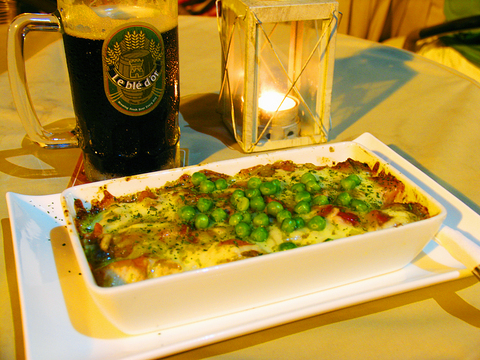Now that the government isn't the only one allowed to brew beer, there are several local startup breweries worth giving a try and others that are worth giving several tries. In the latter group is Le ble d'or, the beer garden located in the courtyard area of the Asia World shopping center.
Of course, Le ble d'or's main selling point is the three beers the company brews itself in Hshichih (
While few diners seemed interested in enjoying a meal outdoors after Le ble d'or opened last August, the place has seen a steadily increasing number of patrons willing to sample their menu of European cuisine and local favorites.

PHOTO: DAVID MOMPHARD, TAIPEI TIMES
Hungarian beef stew with rice shares the menu with a host of seafood dishes; spicy cuttlefish, seafood pizza, seafood chowder and baked mussels, to name a few. But the majority of the menu is given over to what would otherwise be considered pub grub: deep-fried chicken nuggets, nachos and the like. These are served in generous portions (and should be given the prices they carry at NT$280 for a basket of chicken nuggets or NT$250 for nachos) and help the beers go down better.
On my last visit, I had the baked Hungarian beef stew with rice. The beef was of a good quality, but there could have been more of it and the dish would have sat better atop a long-grain rice instead of the local variety. The compromise here is that the rice is prepared loose, not sticky, and soaks up more of the dish's flavor.
And if nothing on the menu tempts your taste buds, there is always the beer. Since it's prepared fresh and not pasteurized it retains more nutritional value than the regular bottled beer. Of the three varieties available, the stout is most like a meal in itself (though it's not as bitter as many European stouts). The Weissen is a personal favorite. With the sediments filtered out, it retains a cloudiness that goes quickly to your head upon drinking the 500cc-sized serving. The most popular is Le ble d'or's lager. It's the most like Taiwan Beer, but a refreshing change from the nation's flagship brew.

Jacques Poissant’s suffering stopped the day he asked his daughter if it would be “cowardly to ask to be helped to die.” The retired Canadian insurance adviser was 93, and “was wasting away” after a long battle with prostate cancer. “He no longer had any zest for life,” Josee Poissant said. Last year her mother made the same choice at 96 when she realized she would not be getting out of hospital. She died surrounded by her children and their partners listening to the music she loved. “She was at peace. She sang until she went to sleep.” Josee Poissant remembers it as a beautiful

Before the last section of the round-the-island railway was electrified, one old blue train still chugged back and forth between Pingtung County’s Fangliao (枋寮) and Taitung (台東) stations once a day. It was so slow, was so hot (it had no air conditioning) and covered such a short distance, that the low fare still failed to attract many riders. This relic of the past was finally retired when the South Link Line was fully electrified on Dec. 23, 2020. A wave of nostalgia surrounded the termination of the Ordinary Train service, as these train carriages had been in use for decades

Lori Sepich smoked for years and sometimes skipped taking her blood pressure medicine. But she never thought she’d have a heart attack. The possibility “just wasn’t registering with me,” said the 64-year-old from Memphis, Tennessee, who suffered two of them 13 years apart. She’s far from alone. More than 60 million women in the US live with cardiovascular disease, which includes heart disease as well as stroke, heart failure and atrial fibrillation. And despite the myth that heart attacks mostly strike men, women are vulnerable too. Overall in the US, 1 in 5 women dies of cardiovascular disease each year, 37,000 of them

Politically charged thriller One Battle After Another won six prizes, including best picture, at the British Academy Film Awards on Sunday, building momentum ahead of Hollywood’s Academy Awards next month. Blues-steeped vampire epic Sinners and gothic horror story Frankenstein won three awards each, while Shakespearean family tragedy Hamnet won two including best British film. One Battle After Another, Paul Thomas Anderson’s explosive film about a group of revolutionaries in chaotic conflict with the state, won awards for directing, adapted screenplay, cinematography and editing, as well as for Sean Penn’s supporting performance as an obsessed military officer. “This is very overwhelming and wonderful,” Anderson